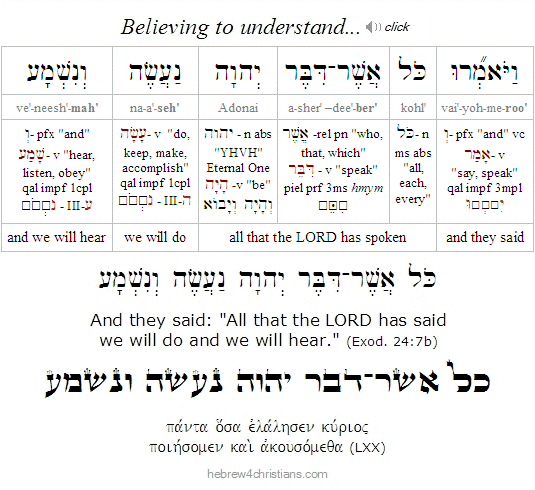|
The commandments of God are usually divided between the rational laws (i.e., mishpatim) and the divine decrees (i.e., chukkim), though this distinction is somewhat artificial, since all of the commandments of Torah (and that includes the Torah of the New Covenant) are grounded in the mystery of God's will, which is to say that we are to obey them simply because they derive from the Divine Authority itself... When the people gathered before Moses to receive the covenant at Mount Sinai, they said all the LORD has spoken "we will do and we will hear" (na'aseh ve'nishmah: נַעֲשֶׂה וְנִשְׁמָע). Note the order: first comes faith in God expressed in the decision to act (na'aseh), and then comes understanding (ve'nishmah). As Yeshua said, "If anyone's will is to do God's will, he will understand" (John 7:17). The heart of faith is willing to do what God asks before hearing (or understanding) what is required. Many people operate the other way round, sitting in judgment of God's word, demanding to understand why they should obey. You cannot understand apart from faith, however, and that is categorically true of all forms of knowledge, which is usually defined as "justified true belief." We are to be "doers of the word and not hearers only, deceiving ourselves" (James 1:22). The Greek verb used in this verse is emphatic: "Be doers!" (γίνεσθε) means "be born!" "Come alive!" "Do, live, and exist before God!" This is a call to creative action, to newness of life...
Hebrew Lesson
Exodus 24:7b reading (click):
The Scriptures state that "if anyone is a hearer of the word and not a doer, he is like a man who looks intently at his natural face in a mirror. For he looks at himself and goes away and at once forgets what he was like" (James 1:23-24). If we just hear the truth but do not act upon it, we are comically likened to someone who carefully looks at his face in a mirror but then promptly forgets what he looks like after he steps away... Likewise those who only hear the word but do not "bring it to life" in their deeds forget who they are and why they were created (Eph. 2:10; Titus 2:14; Col. 1:10). When we look into the mirror of truth we see our need for teshuvah and turn to God for the healing miracle he provides (Heb. 4:12). It's not about doing but being, though being is revealed in doing... If your actions do not align with your values, then back up and recover who you really are in Messiah, understand what your new nature truly is. That is what it means to "take up the yoke" of Messiah, for his yoke is easy (kal) and burden is light, and the task is to repeatedly practice allowing Him to carry your pain, shame, and sin far, far away from your heart.
There is a deeper law, however, a "mirror" that reveals something beyond our passing image. When we look intently into the "perfect law of liberty" (תּוֹרַת הַחֵרוּת וּמַחֲזִיק) - the law of faith, hope, and love for our Savior - we find blessing in our deeds (James 1:25). Note that the verb translated "look into" the law of liberty is the same used when John stooped down to "look inside" the empty tomb of Yeshua (John 20:5). The deeper law reveals the resurrection power of God's invincible love. The Torah of the New Covenant also has many mitzvot, though these are based on the love God gives to us in Yeshua: "This is my Torah: that you love one another as I have loved you" (John 13:34).
Related Topics:
Podcast:
|



